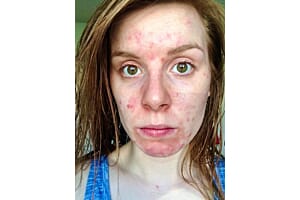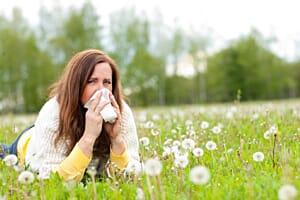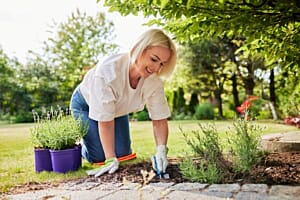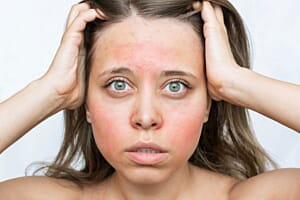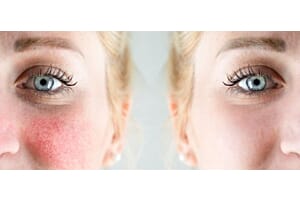Cold sores are the bane of almost half the population and winter colds and flu tends to bring them out from their hiding places under the skin around the mouth.
Most cold sore suffers will of course be painfully aware of why they have cold sores. However just for the record, cold sores are caused by the Herpes Simplex virus that in present in over 50% of population.
[quote]However IF you get cold sores at all and how often and how badly you get them comes down to your own immune system and susceptibility to the herpes virus. Some people get a sore once a year some get them once a month.[/quote]
Triggers that can make cold sore more frequent are sun exposure (even winter sun can trigger a cold sore), colds and flu, pregnancy, lip trauma, dental treatment, post-medication such as after taking antibiotics, lack of sleep, high alcohol intake, excessive exercise, stress and hormonal changes.
Cold sores mainly occur on the skin next to the mouth, mostly on the lips, although sometimes they can appear on the chin, nostrils, fingers or genitals. Type 1 Herpes Simplex tends to only manifest itself in actual cold sores on the lips and face, Type 2 tend to appear on the genitals. They rarely appear inside the mouth, although this does sometimes happen.
Cold sores are highly contagious and are usually passed on through kissing, close physical contact, oral sex and drinking from the same vessels of an infected person.
[quote]However what most people don’t know is that the majority of sufferers catch them from their mum when they are babies.[/quote]
3 stages of a cold sore
Stage 1 – Tingling and inflammation known as prodrome. This tends to appear a the site of the impending sore a day or two prior to the actual appearance of the cold sore
Stage 2 – The appearance of one or more small, painful and fluid-filled red or brown blisters, which develop for 3-5 days and then burst and ooze.
Stage 3 – Scabbing. The cold sore starts to dry, scab over with a yellowish crust and eventually heal.
[quote] Ultimately once a cold sore erupts, there is not much that can help except treatments to ease to the pain, prevent further infection from external bacteria or cosmetically cover up the sore, which is the function of most treatments from the pharmacy or your doctor.[/quote]
So the only truly effective way to try and tackle cold sores is making changes to your health and diet regimes and using treatments that can increase the duration of time between cold sore outbreaks – in short prevention is better than cure.
Here are some useful bits of information gathered from various published research and decent anecdotal reports on how help prevent a cold sore before it’s developed rather than simply treating a cold sore after it has arrived.
Lemon balm
Melissa oil, more commonly known as lemon balm, is renowned for its strong anti-viral action and there is a bank of evidence, both published and anecdotal, to show that topical forms of Melissa oil are effective at preventing cold sores.
In a published trial at the University of Maryland, scientists found that applying lemon balm ointment to patches of skin prone to cold sores led to a significant improvement in redness and swelling of the cold sores when they erupted compared with those given a placebo. In another trial, volunteers who used lemon balm in a cream four times daily as a preventative measure before their cold sores appeared, saw their cold sores heal quicker.
Liquorice
The key cold sore fighting ingredient in liquorice is glycyrrhizic acid (GA). GA specifically targets the genes that are required to maintain the virus in its latent state by interfering with the production of special proteins that feed the infected cells. Research published in the US Journal of Clinical Investigation has shown that liquorice has the ability to weaken the cold sore virus which lies dormant in the skin between outbreaks.
A liquorice lip balm was found to be effective in a double-blind trial, carried out by the Herpes Viruses Association on forty people with cold sores.
Using the lip balm regularly in between outbreaks reduced the severity and duration of outbreaks for over 73% of subjects tested. Furthermore, 83% of subjects using the liquorice balm reported experiencing less severe outbreaks than when using their conventional treatments.
[quote]While using the liquorice lip balm, testers reported that on average their outbreaks were only half their normal length.[/quote]
Manuka Honey
Honey contains high concentrations of sugar in the form of fructose and glucose. Such a high concentration of sugar makes it difficult for bacteria and fungus to survive. For people with cold sores, this may mean faster healing because the immune system does not also have to defend against these germs, leaving it free to focus on the virus. Honey also supplies rich levels of flavonoids and phenolic acid, compounds that fight the herpes simplex virus in test tubes.
Manuka honey is more powerful at fighting the Herpes virus because it contains an anti-viral compound called methylglyoxal that is not found in other types of honey.
A study published in the "Medical Science Monitor" by Noori S. Al-Waili, M.D., a physician in private practice in the United Arab Emirates, compared the use of an unspecified type of topical honey to a typical over the counter cold sore treatment on eight people with cold sores.
For patients who applied honey four times per day to their lips in between cold sore outbreaks, the outbreak healed in three days, compared with six days for the standard cold sore treatment.Pain resolved in one day, compared with three days for standard treatment.
[quote]In addition, application of honey during the prodrome phase -- the tingling and soreness before skin symptoms actually appear -- actually prevented an outbreak for two patients.[/quote]
Raw onions both eaten regularly, in particularly at the first tingling signs of a cold sore emerging, and also rubbed on the spot where a cold sore usually breaks out can help reduce the severity and frequency of cold sore outbreaks due to the anti-inflammatory and anti-bacterial effects of onions, according to wide anecdotal evidence.
There is little evidence we could find to indicate that onions do any harm to cold sores, and plenty of evidence to suggest that they help.
Lysine
Lysine is an essential amino acid, meaning that we must get it through food or supplements because the body can't make it on its own. It's used to make protein, which we need to produce infection-fighting antibodies, enzymes, hormones, and body tissues. Lysine has been found to inhibit the spread of the herpes simplex virus.
Although we get lysine through food sources such as red meat, milk, eggs, cheese, wheat germ, brewers yeast, and fish, what appears to be most important is the ratio of lysine to another amino acid, arginine. They compete with each other for absorption in the intestines, so the less arginine there is in the diet, the more lysine is absorbed. Foods that are rich in arginine include chocolate, peanuts, and almonds.
[quote]Some evidence suggests that lysine supplements (e.g. 1,000 mg taken three times a day) may help to shorten the duration of cold sores.[/quote]
However some people report some side effects while taking lysine as users can expect higher levels of triglycerides inside the blood as well as higher cholesterol levels as well. Taking too much lysine can cause muscle cramps, nausea and diarrhoea.
Resveratrol
Resveratrol, a compound found naturally in red grapes (and red wine), has been shown to be active against the herpes simplex virus in laboratory studies.
[quote]A study by the North Eastern Ohio University demonstrated that resveratrol cream applied topically two, three, or five times a day effectively suppressed cold sore development if it was applied one or six hours after infection with the herpes virus.[/quote]
Resveratrol cream was also found to be as effective as 5% acyclovir ointment.
Resveratrol cream also effectively suppressed cold sore formation in animals with herpes simplex infection that was resistant to the standard cold sore treatment acyclovir. No side effects were reported.
Black tea
Black tea contains tannic acid which several studies have shown has an anti-viral effect against cold sores when both consumed regularly and used topically.
[quote]Hot tea either drunk or rubbed on cold sore weak spots is likely to do more harm than good as the heat trauma to the skin is likely to trigger the latent virus into action.[/quote]
However drinking cooled or even iced black tea on a daily basis and distributing a little around the lip area can be a helpful preventative for cold sores.
Wear an SPF lip product
Sun is the most common trigger for cold sores as UV damage activates the latent herpes virus that lies dormant in the skin next to the lips.
[quote]So wearing a daily lip SPF product that stops UV rays from damaging the lips and the skin around the lips is a singularly effective preventative measure for helping to ward off cold sore outbreaks.[/quote]
Avoid colds
Colds are a danger zone for cold sores as not only is your immunity down, constant nose wiping and blocked noses can cause trauma and drying to the lips which is another trigger to activate the herpes virus. Any weakness, such as abrasion, chapping or cracking, to the lips is an immediate wake-up signal to the herpes virus to become active.
Take zinc and a vitamin c supplement in the run up to winter, cut down on alcohol and don’t over exercise during the cold season to try and keep your colds to a minimum.
What to definitely AVOID when treating a cold sore
There is a lot of advice out there on other remedies that work for cold sores. Some are based on no evidence at all, some are based on vague anecdotal examples with as many saying they cause damage or don’t work as those saying they so, others are based on old wives tales.
Having vigorously trawled the internet to find the for and against anecdotal reports on some of these weird and wonderful cold sore remedies, these are the one we feel its best you AVOID as they may do more harm than good.
For treating a cold sore, don’t try this at home …..
Vodka
Perfume
Baking soda
Urine
Peppermint oil



